10 innovative food start-ups to look out for in 2022

Building a successful start-up in the food and drinks industry is no easy feat. According to recent statistics, 20% of start-ups don’t make it past their first year, while 30% fail in their second and over half don’t get to run the company past five years. It is therefore impressive when start-ups show real promise within or past this five-year period, as it’s often a good indicator that they’ll help to influence how and what we eat in the future.
Some of the key trends for food tech in 2021 according to Digital Food Lab have included:
- Sustainable proteins
- Food automation (in the form of cloud kitchens, smart stores or deliveries using robots and drones)
- Sustainable farming
This list of start-ups to watch cover all of these innovations and consumer demands. From lab-grown meat or fermented seafood alternatives to AI food delivery services and sustainable on-site hydroponic farming, the following 10 companies are who you can expect to be driving change in the foodtech world in 2022.
Everli
Founded in 2014 by Enrico Pandian in Verona, Italy, the online marketplace Everli has become a hugely successful company in the past seven years. The e-grocers helps customers order from their preferred local supermarkets for home delivery. Items are usually delivered to customers within the hour. While takeaway food delivery services increased significantly during the pandemic, the popularity of the service has not declined, and Everli’s growth continues to accelerate.
The company currently operates in over 80 cities across Europe in countries which include, Italy, France, Poland and Czech Republic, and recently expanded their services this year to Germany and Romania. The business has also just signed an agreement with the Láhve wine store, to deliver around 500 types of wines to customers in Prague. They also have plans for further expansion into Poland through their partnership with Auchan Retail Group, who have locations situated across southern and eastern Europe, as well as Senegal, Tunisia and Taiwan.
Serve Robotics
The USA-based on-demand robotic self-driving delivery service has a mission to provide consumers with a more eco-friendly and contactless food delivery service ever since they were founded in 2017. The project was created by the delivery app Postmates.
This year, the company gained its first commercial partner in Uber to bring Serve Robotics delivery to customers using the Uber Eats app in Los Angeles from next year. The AI business currently delivers in both Los Angeles and San Francisco. The business has since received a further $13M in a seed funding round, to help the AI powered robotic delivery service expand to new areas in the US, as well as improving the machines’ autonomy. The company will also use this money to expand its partnerships, as well as looking to deliver other goods such as medicines and alcohol.
Cultivated Biosciences
The Swiss company creates new plant-based fats from GMO-free fermented yeast and have achieved a lot considering they were only founded this year. The ingredient is used in applications to add creaminess to dairy-free products. Cultivated Biosciences joined the ProVeg Incubator programme in 2021, which mentors start-ups who work in the plant-based and alternative proteins sector to help them find investment and grow their businesses.
With the plant-based dairy market expected to surge over the next seven years according to recent reports, Cultivated Biosciences are targeting a stable, growing market. Plant-based dairy has also been said to have several health benefits including being low in cholesterol and calories, as well as having high amount of antioxidants and fatty acids which can reduce the risk of diabetes, heart disease and cancer.
The company expect their product to be available for the B2B market by the end of 2024.
Good Catch
This seafood-alternative company was founded by brothers Chad and Derek Sarno, the duo behind popular plant-based brand Wicked Kitchen.
Their range of products include plant-based breaded fish sticks, fillets, crab cakes, Thai-style fish cakes, fish burgers, and New England-style crab cakes, as well as three types of plant-based tuna: naked in water, Mediterranean, and oil and herbs. The brand has just recently launched three new products in the UK’s supermarket giant Tesco.
Good Catch’s backers include the actor Woody Harrelson, singer Lance Bass and TV personality and socialite Paris Hilton.
As the dangers of overfishing and plastic pollution continue to be realised, but global fish consumption being expected to rise by 18% by 2030, sustainable aquaculture has been a fast-growing market this year and will continue to expand further in 2022.
Gourmey
The market for cell-based foie-gras could become big in the very near future. Following a 2006 ban on production on our soil, in March, MPs called for a ban on imports of foie-gras, because of its cruel production methods. Production of the product has been made illegal in a number of European countries including Czech Republic, Finland, Turkey, Italy, and Poland. While the production of the French delicacy might prove harder to ban in its country of origin, Grenoble, Strasbourg and Lyon all recently decided to stop serving it at official events on cruelty grounds. The mayor of Grenoble has even described the product as “not a French speciality but a French shame”.
Parisian brand Gourmey’s cultivated foie-gras therefore couldn’t have come at a better time. Founded in 2019, the company managed to secure $10M in funding in the summer of 2021 in a round led by Beyond Investing and Big Idea Ventures. They’ve also received backing from investment bank, Bpifrance and the European Commission. Gourmey is said to be one of the first French start-ups to be involved in cell-based poultry production. The company expect to have their foie-gras on the market by the end of next year or the start of 2023.
Redefine Meat
Since the company was founded in 2018, Redefine Meat have made steady progress in the plant-based meat industry. That same year they created the world’s first-ever 3D-printed steak. Since then, as well as growing their team through various successful funding rounds, this year they hired 100 employees, and have also launched their products in a number of selected Israeli restaurants and hotels
The renowned celebrity chef and restaurateur, Marco Pierre White has also just recently started to put the brand’s 3D-printed steaks on the menus of his restaurants, including some of his steakhouses across the UK and three other London-based spots.
Babylon Micro-Farms
This start-up probably has some of the youngest founders in the list. Alexander Olesen and Graham Smith both met while studying for their undergraduate degrees at the University of Virginia when they decided to launch Babylon Micro-Farms in 2017. The concept of the business is that it makes indoor farming easy and accessible for everyone – schools, universities, hospitals, senior residence communities.
The company’s sustainable on-site hydroponic farming equipment is accompanied by the Micro-Farms and Guided Growing App – an educational platform to advise the Micro-Farm users on what crops they can grow, how well they’re growing, as well as when to harvest.
In November, Aramark, the American customer service business working across food, facilities and uniforms services, partnered with Babylon Micro-Farms to install their hydroponic vertical farming plant walls into dining halls in several university campuses that Aramark already work with. These universities include Western Carolina University, University of South Carolina and Lander University, and Virginia Commonwealth University.
Head Grower at Babylon Micro-Farms, David Lopez recently pitched the start-up to investors at November 2021 Food Tech Matters event.
Mosa Meat
The Dutch start-up based in Maastricht, was co-founded by food technician Peter Verstrate and Professor Mark Post in 2016. Peter and Mark met in 2006 during completion of a government-funded program in developing cultured meats. After they showed their first cultured beef burger to the world in London in 2013, they later founded Mosa Meat together. The company today is made up of an established team of scientists and engineers.
Mosa Meat create their cultured beef by taking a 0.5g sample of cells from a range of healthy cows. The sample is taken under anaesthesia, to avoid distressing the animal unnecessarily. Extracting 33,000 myosatellite cells can produce around 80,000 burgers, as the cells grow into a similar structure to the muscle and fat that would be inside a cow.
Backers of the start-up include the Academy Award Winning actor Leonardo DiCaprio, who also sits on the board of advisors. In October, the organisation also announced they received €2M from the European REACT-EU fund, a recovery assistance programme. The fund will allow them to work with Nutreco, a Dutch producer of animal food, fish feed and processed meats, in the near future. The partnership aims to get cultivated beef goods on the European market and bring major improvements to cellular food production through a project called ‘Feed for Meat’.
Twiga Foods
Founded in 2013, Twiga Foods strives to improve food distribution in Kenya by bringing together retailers and farmers through a digital app, to help to increase the range of produce available to consumers. According to Twiga, around 90% of sub-Saharan Africa is made up of informal, independent retailers. In 2019, the company also successfully connected FMCGs and manufacturers with retailers across Africa to increase profits.
More recently, they have announced an expansion to other areas in East Africa including Nyanza and the South Rift Valley. This comes following they raised $50M in funding from investors such as TLcom Capital and IFC Ventures last November.
Aqua Cultured Foods
Founded by Brittany Chibe and Anne Palermo in 2020, this Chicago-based start-up is another seafood alternatives brand emerging in the market. The company uses a unique fermentation technology to create alternative options for tuna, shrimps and whitefish, which all have similar nutrition values to well-known fish options like cod. None of their products contain any sodium or saturated fats and are therefore also low in cholesterol.
Being just a year old, Aqua Cultured Foods already has a bright future ahead, since recently forming a Proof of Concept (PoC) agreement with Migros, a major retailer in Switzerland. The business is also continuing to scale up their production in Chicago, aiming to bring their first products to the commercial market in 2022.
As consumer demand for more sustainable and cruelty-free produce increases, and the need for environmentally-friendly food production has become more urgent than ever, there are great opportunities for growth and expansion for innovative, viable and scalable start-ups.








